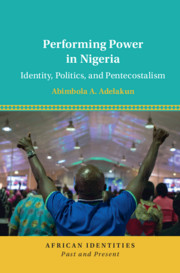Book contents
- Performing Power in Nigeria
- African Identities: Past and Present
- Performing Power in Nigeria
- Copyright page
- Dedication
- Contents
- Acknowledgments
- Introduction: Power Identity: Politics, Performance, and Nigerian Pentecostalism
- 1 Demons and Deliverance: Discourses on Pentecostal Power
- 2 “What Islamic Devils?!”: Power Struggles, Race, and Christian Transnationalism
- 3 “Touch Not Mine Anointed”: #MeToo, #ChurchToo, and the Power of “See Finish”
- 4 “Everything Christianity/the Bible Represents Is Being Attacked on the Internet!”: The Internet and Technologies of Religious Engagement
- 5 “God Too Laughs and We Can Laugh Too”: The Ambivalent Power of Comedy Performances in the Church
- 6 “The Spirit Names the Child”: Pentecostal Futurity in the Name of Jesus
- Conclusion: Power Must Change Hands: COVID-19, Power, and the Imperative of Knowledge
- Select Bibliography
- Index
6 - “The Spirit Names the Child”: Pentecostal Futurity in the Name of Jesus
- Performing Power in Nigeria
- African Identities: Past and Present
- Performing Power in Nigeria
- Copyright page
- Dedication
- Contents
- Acknowledgments
- Introduction: Power Identity: Politics, Performance, and Nigerian Pentecostalism
- 1 Demons and Deliverance: Discourses on Pentecostal Power
- 2 “What Islamic Devils?!”: Power Struggles, Race, and Christian Transnationalism
- 3 “Touch Not Mine Anointed”: #MeToo, #ChurchToo, and the Power of “See Finish”
- 4 “Everything Christianity/the Bible Represents Is Being Attacked on the Internet!”: The Internet and Technologies of Religious Engagement
- 5 “God Too Laughs and We Can Laugh Too”: The Ambivalent Power of Comedy Performances in the Church
- 6 “The Spirit Names the Child”: Pentecostal Futurity in the Name of Jesus
- Conclusion: Power Must Change Hands: COVID-19, Power, and the Imperative of Knowledge
- Select Bibliography
- Index
Summary
This chapter, The Spirit Names the Child: Pentecostal Futurity in the Name of Jesus, shows how naming rituals are a source of Pentecostal power and influence, and remain strong for a long time. As power identity has argued that the Pentecostal politics of identity is not primarily construed along the lines of ancestry and familiar markers such as ethnicity, nationality, class, etc., but the object of desire, this chapter also shows that Pentecostals do not entirely dispense with ancestral or familial modes of identification. Instead, they supplant them in creative ways that show their power within social culture. To illustrate how the Pentecostal power is invested in the rhetoric of naming, I study an aspect of Pentecostal identity building: both giving oneself and one’s children names that include “Jesus” (or “Jesu” in Yoruba) to fully embed the social and spiritual atmosphere of the society with their values. The Pentecostal onomastic, I note, is thus a sonic and systematized politics of societal ordering and contestation of spaces. The antiphony of names as a process of “call and response” is the interaction of the many “transcendences” of Africa.
- Type
- Chapter
- Information
- Performing Power in NigeriaIdentity, Politics, and Pentecostalism, pp. 208 - 235Publisher: Cambridge University PressPrint publication year: 2021

